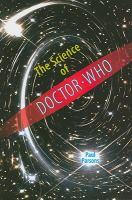
 I've been a massive fan of the TV show Doctor Who since I was 13. Even at its worst, the show excites me and inspires me like nothing else. Although principally seen as a science fiction show, it's always played a little fast and loose with real science. Or has it?
I've been a massive fan of the TV show Doctor Who since I was 13. Even at its worst, the show excites me and inspires me like nothing else. Although principally seen as a science fiction show, it's always played a little fast and loose with real science. Or has it?
In The Science of Doctor Who, scientist and journalist Paul Parsons looks at much of the science presented in both the classic and the modern show, giving a basic introduction to contemporary scientific thought on time travel, faster-than-light travel, extraterrestrial life, alternate dimensions, robotics, cybernetics, genetics and more. It's all very interesting, and while it's clear that we have a long way to go before much of the science in the show will be possible--and there's still a lot that may never be possible—it’s fascinating to learn how much of the science in the show has been looked at and examined--and in some cases, tested.
Parsons admits in the book that this isn't meant to educate so much as entertain, and while I did learn a lot, it's clear that the science he talks about is just the tip of the iceberg. The book is a pretty easy, breezy read. But it did make me want to read more on quantum physics, astrophysics and cybernetics. I've put books by Brian Greene and Michio Kaku on my For Later shelf. And it put me in mind to go back and re-watch my favorite episodes of Doctor Who, which is never a bad thing.
